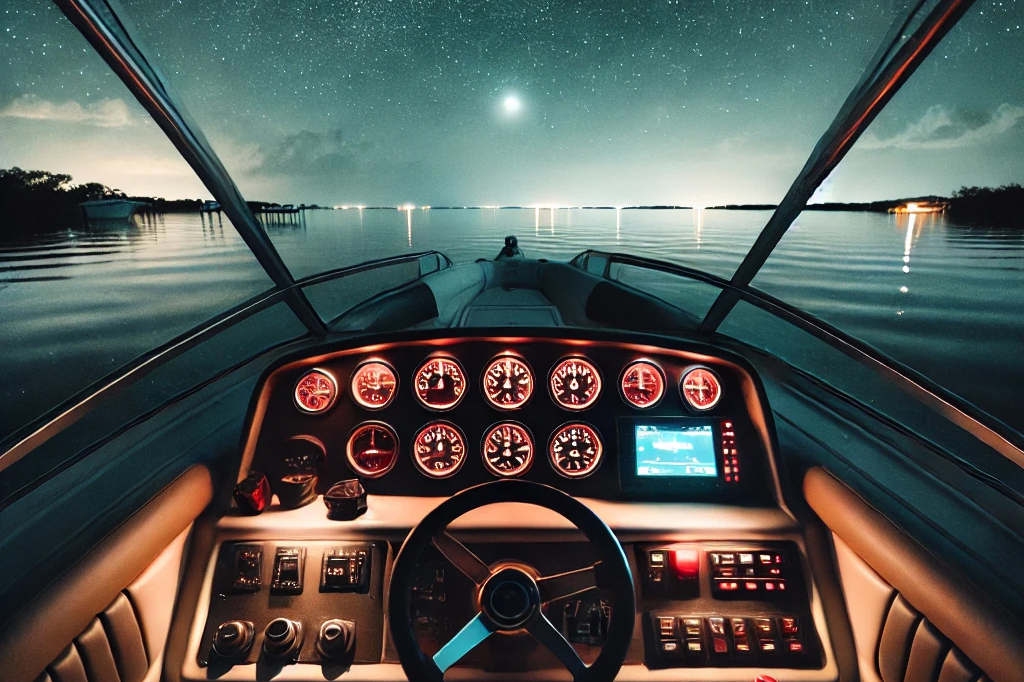Boating at night can offer a unique and serene experience. Night boating is quieter and can be more comfortable, with fewer boats on the water and cooler temperatures, creating a very relaxed atmosphere. However, night boating also comes with its own set of challenges and risks. Whether you’re setting out for a moonlit fishing trip or an evening cruise or want to experience the tranquility of the water after dark, it’s crucial to be well-prepared. Here are some best practices and safety tips to help ensure your night adventure is safe and enjoyable.

Prepare Your Boat and Equipment
Before heading out on a night boating trip, make sure your boat is fully equipped and in good condition. Check that all navigational lights are functioning correctly, as they are crucial for your safety and that of other boaters. The U.S. Coast Guard requires specific lighting for boats operating at night, so ensure your boat meets these regulations. Additionally, carry spare bulbs and batteries for your lights.
Your safety equipment, including life jackets, should be easily accessible. Having a spotlight or high-powered flashlight on board is crucial to help navigate and spot obstacles. Reflective tape on life jackets, oars, and other equipment can also be helpful in an emergency.
Check Your Fuel Levels
Running out of fuel is always inconvenient, but it’s especially problematic at night when on-water fueling stations are closed. Before heading out, double-check that your fuel tank is full and that you have enough fuel for the entire trip, including a reserve for unexpected detours or delays. It’s better to overestimate your fuel needs than risk getting stranded after dark.
Plan Your Route Carefully
Nighttime reduces visibility, making it harder to spot landmarks, navigational aids, and other vessels. Therefore, it’s essential to plan your route in advance. Familiarize yourself with the area and use your charts or GPS to identify potential hazards such as shallow areas, rocks, or buoys.
If possible, stick to familiar waters. If you’re exploring a new area, take extra caution and slow down to avoid running aground or colliding with unseen obstacles. Mark critical waypoints on your GPS and ensure your route is well-lit with navigational aids.
Slow Down and Stay Alert
At night, your depth perception is reduced, and objects can appear differently than they do during the day. Slow down and keep a watchful eye on your surroundings. Look for the lights of other boats and navigational aids, and be aware that not all hazards may be lit.
Assign someone to be a lookout to help spot potential dangers. It’s also important to avoid distractions—this is not the time to fiddle with your phone or have in-depth conversations. Your full attention should be on navigating safely.
Use Your Navigation Tools
Relying on your natural senses alone can be challenging at night. Use your boat’s navigation tools, such as GPS, radar, and depth finders. These tools will help you stay on course and avoid obstacles that may not be visible to the naked eye.
If your boat is equipped with radar, it can be particularly useful for detecting other vessels and large objects in your path. Your depth finder can help ensure you don’t run aground in shallow waters. Always cross-check what you see on your screens with what you observe in your surroundings.
Manage Your Interior Lights
Bright interior lights can interfere with your night vision, making it difficult to see outside the boat. To preserve your night vision, dim interior lights or use red lighting, which has less impact on your eyes. This will help you maintain better visibility of your surroundings and reduce glare. Also, avoid shining flashlights or other bright lights directly overboard, as this can disrupt your vision and affect other boaters nearby.
Communicate with Other Boaters
Keep your marine radio on and tuned to the proper channel if you need to communicate with other boaters or the Coast Guard. If you’re boating with a group, establish a plan and stay in close contact to avoid losing sight of each other.
Use your horn, bells, or other sound signals as required to alert nearby vessels of your presence. If you encounter another boat, be aware of the right-of-way rules and be prepared to take evasive action if necessary. Learn more here: https://goboatingflorida.com/navigation-basics/
Be Weather-Wise
Weather conditions can change rapidly, especially at night. Check the weather forecast before you depart and regularly while on the water, and be aware of any potential storms or high winds that could affect your trip. If you notice the weather worsening while on the water, head back to shore immediately.
Keep an Eye on the Clock
Time can pass quickly when you’re enjoying the serenity of the water at night. It’s easy to lose track of time, so be mindful of your return time and how long it will take to return to your dock or marina. Navigating in the dark can take longer than during the day, so allow extra time for a safe return.
Stay Sober and Well-Rested
Operating a boat at night requires total concentration. Avoid alcohol and stay well-rested before your trip. Fatigue can impair your judgment and reaction time, which is especially dangerous in low-visibility conditions.
Night boating can be an unforgettable experience, offering a peaceful and different perspective on the water. By following these best practices and safety tips, you can ensure that your night on the water is both enjoyable and safe. Remember, preparation is key, and staying alert is essential. With the right mindset and equipment, your night boating adventures in Southwest Florida will be something to treasure for years to come.
